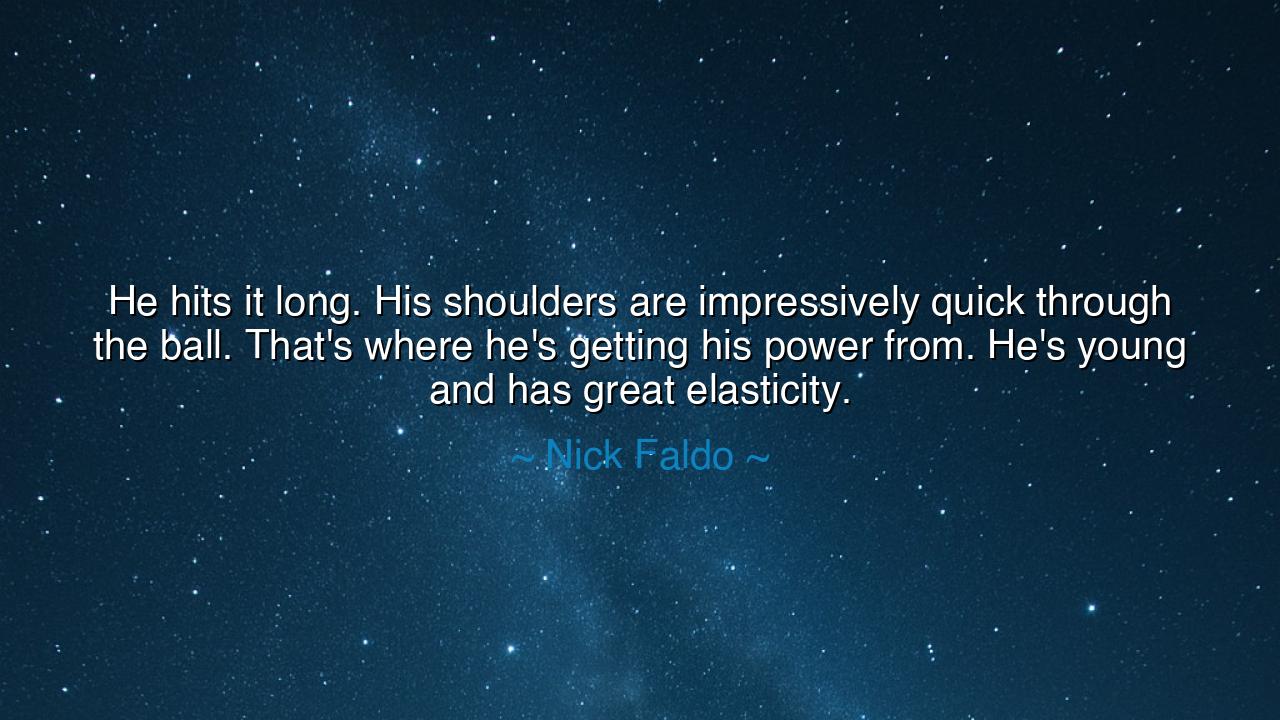
He hits it long. His shoulders are impressively quick through
He hits it long. His shoulders are impressively quick through the ball. That's where he's getting his power from. He's young and has great elasticity.






In the chronicles of the green fairways and wide galleries, the voice of Nick Faldo, knight of golf and master of discipline, spoke words that resound with admiration and wisdom: “He hits it long. His shoulders are impressively quick through the ball. That's where he's getting his power from. He's young and has great elasticity.” At first, it seems but the observation of a swing, the passing remark of one master upon another. Yet in truth, these words reveal the eternal law of youth, of strength, and of the fleeting fire that grants men their moment of glory.
To strike long is the dream of every golfer, and the mark of a body filled with vigor. It is not only the arms, nor the wrists, but the shoulders, quick and unyielding, that bring forth the strike of power. Faldo, in his wisdom, saw that greatness in sport arises not from chance, but from the harmony of body and motion. He spoke of elasticity, the supple strength of youth that bends and does not break, that stretches beyond limits and returns with force. This is the gift of time’s early season—the spring of life, when the body answers every command with swiftness.
Yet Faldo’s words are more than praise of one young man’s gift. They are a reminder that power lies not only in raw strength but in technique joined with energy. The quick shoulders, the flowing elasticity—these are not merely accidents of youth, but skills cultivated, refined, shaped like a sword in fire. Power without direction is chaos, but power guided by fundamentals becomes greatness. In this, Faldo teaches us that ability is not enough; it must be wedded to discipline.
History offers us many such examples. Consider Alexander of Macedon, who in the bloom of youth commanded armies across continents. His strength was great, his energy seemingly limitless. But it was not strength alone that won him empire—it was the speed of his thought, the quickness of his tactics, the elasticity of his will that could bend to circumstance and spring back with brilliance. Like the golfer whose shoulders snap through the ball, Alexander’s genius was born of both youthful vigor and the harmony of controlled technique.
But hear this also: Faldo’s words, while praising youth, whisper of its passing. Elasticity fades with age; quickness slows; power diminishes. The body cannot forever remain young. What then endures? It is the knowledge, the fundamentals, the wisdom forged in years of labor. Youth strikes long; age strikes true. The master sees in the young the promise of glory, but also the fleeting nature of it. Thus, he honors it while it burns, yet knows it must be replaced with something deeper in time.
The lesson is clear: in your youth, rejoice in your power. Train your body, refine your skills, stretch yourself beyond limits. But do not rely on strength alone, for strength is the most temporary of gifts. Build instead the foundations of discipline, wisdom, and technique, which endure beyond the years of elasticity. If you are young, train both your body and your mind. If you are older, do not despair, for wisdom can outlast the fire of youth and carry you to triumph in new ways.
So let Faldo’s words be remembered not only as the praise of a golf swing, but as a parable of life itself: power springs from youth, but mastery is born of discipline. Rejoice in your elasticity while you have it, but prepare your soul with wisdom that will endure. For every man has his season of speed, but only the wise carry strength into all the seasons of life.






AAdministratorAdministrator
Welcome, honored guests. Please leave a comment, we will respond soon